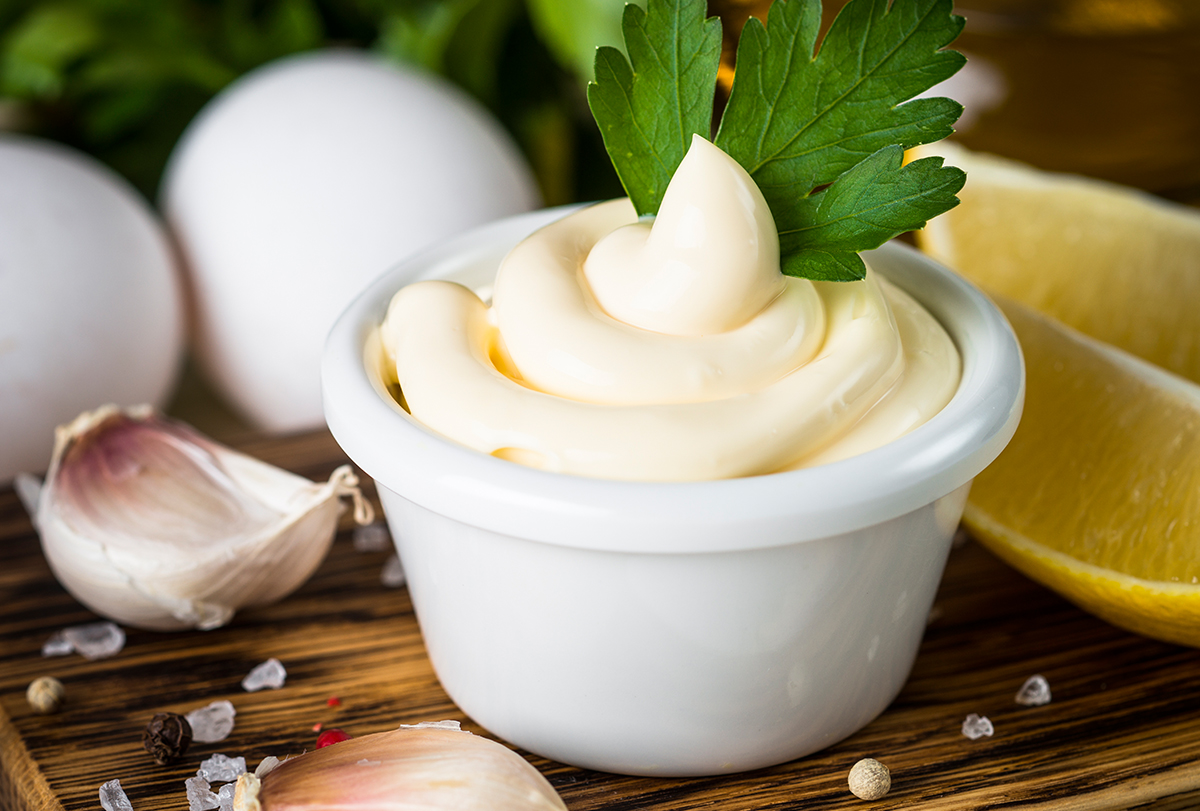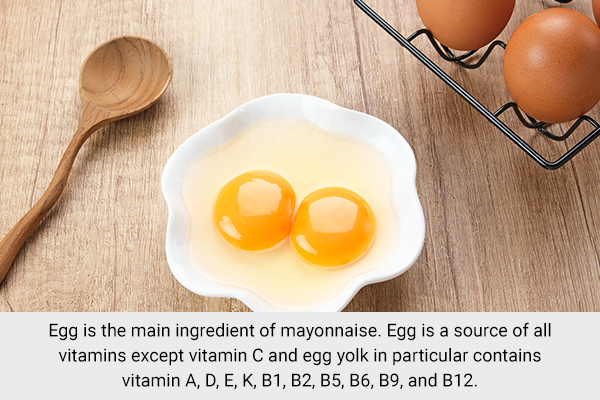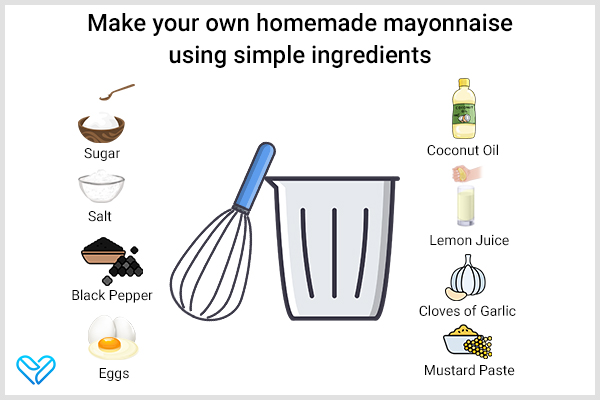In this article:
There is hardly any person who isn’t a fan of the delicious creamy mayonnaise, which elevates anything from a humble sandwich to a fresh salad.

The origin of mayonnaise is thought to be French, where it was brought to Port Mahon in 1756 (from Spain). It was first called maho’nnaise from the old French words for egg yolk and stir. (1)
Mayonnaise’s popularity soared in the 1900s, and now each region has its own take on the recipe.
The traditional ingredients of mayonnaise include: (1)
- Vegetable oil
- Egg yolk
- Vinegar or lemon juice
- Seasoning such as salt, pepper, mustard, or garlic
One of the biggest challenges accompanying mayonnaise consumption is its high oil and cholesterol content. (1)
Commercial mayonnaise is made by using refined soybean oil, sunflower oil, or corn oil, which are high contributors of saturated fatty acid and unsaturated fatty acid, and increased dietary fat intake is associated with diseases such as atherosclerosis (high cholesterol levels in the blood vessels), obesity, heart disease, and even cancer. (2)
For this reason, it is recommended to prepare your mayonnaise at home in limited batches using good-quality oil such as flaxseed oil or virgin coconut oil to obtain the most benefits from it. These oils contain medium-chain fatty acids, which are healthier than saturated fatty acids.
In addition, homemade mayonnaise is free from gums, additives, and shelf stabilizers. (2)
Health Benefits of Homemade Mayonnaise
It may seem surprising a high-fat food such as mayonnaise could offer health benefits, but including a limited serving (1 tablespoon per day) in your diet can actually be good for you!
1. Provides healthy fats
Since mayonnaise is 70%–80% oil, choosing the right kind of oil is very important.
One of the healthiest oils you can use to prepare your homemade mayonnaise is flaxseed oil. (2) Not only will it allow our mayonnaise to last longer, but it is also a rich source of omega-3 fatty acids, which are strong natural antioxidants.
Along with the alpha-linoleic acid, another potent fatty acid in flaxseed oil, omega-3 fatty acids can: (3)
- Reduce the risk of heart diseases
- Reduce the formation of fatty plaques in the blood vessels
- Improve insulin sensitivity and reduce free radical damage in type 2 diabetes
- Ease the inflammation and resulting pain from arthritis
- Aid in the prevention of cancer as they reduce free radical damage
Another healthier oil you can use is coconut oil. Not only will it add to the flavor of the mayonnaise, but it has also been identified to reduce the risk of heart diseases, reduce inflammation in the body, aid in weight loss, and provide antimicrobial properties. (4)
2. Provides vitamins and minerals

The second main ingredient of mayonnaise is eggs. Eggs are a source of all vitamins except vitamin C, and egg yolk in particular contains vitamins A, D, E, K, B1, B2, B5, B6, B9, and B12. (5)
In addition, eggs are a rich source of choline (680 mg/100 g egg). Choline is neither a vitamin nor a mineral, but it is a nutrient needed in the body to carry out essential functions such as transporting nutrients, maintaining muscle tone, and keeping the brain healthy.
Though the liver can produce some amount of choline, it has to be largely consumed via the diet. (5)
Eggs are also rich sources of essential and trace minerals such as selenium, zinc, phosphorus, magnesium, iron, and copper. (5)
3. Increases beta carotene levels
Mayonnaise itself doesn’t contain beta carotene, but a study has found it to increase the absorption of beta carotene when eaten with a food rich in the nutrient such as carrots. (6)
Beta carotene is an important antioxidant and is also converted to vitamin A in the body. It can improve vision, reduce free radical damage, and even prevent the risk of cancer. (7)
So, the next time you eat a salad containing carrots, add half a tablespoon of mayonnaise to increase the absorption of beta carotene.
4. Improves brain health
Daily intake of mayonnaise in recommended amounts may help improve brain health. This is primarily attributed to the egg content.
As discussed above, choline, which is abundantly present in egg yolk, can increase the function of dopamine (the feel-good hormone) as well as can improve memory. Studies have identified the role of dopamine in improving memory and behavior in degenerative brain disorders. (8)(9)
Choline is also responsible for producing a compound called phosphatidylcholine, which can benefit those suffering from Alzheimer’s disease. (8)
Although these benefits are better obtained by eating whole eggs, some amount of mayonnaise consumption can also be beneficial due to its egg content.
5. Nourishes the skin

The rich oil content in mayonnaise is beneficial for the skin. Not only will eating mayonnaise provide lubrication and moisture from within, but the application of mayonnaise on extremely dry and patchy skin may help improve the condition.
Using mayonnaise made from coconut oil can be particularly useful for this function. (10)
Some people also advise using mayonnaise for relieving the pain and itching from sunburns; however, this claim has no scientific evidence.
6. Makes hair healthy
Mayonnaise can benefit hair health and promote the appearance of silky and shiny hair. This benefit can also be attributed to eggs. A hair growth factor in eggs called vascular endothelial growth factor can stimulate the growth of new hair. (11)
Eggs also provide biotin, the deficiency of which is known to cause hair loss. (12) In addition, the oil-rich component of mayonnaise can be beneficial for nourishing and hydrating the hair.
How to Make Mayonnaise
You can easily make your own homemade mayonnaise using simple ingredients.

- Add ½ tablespoon of sugar, 1 teaspoon of salt, and ½ teaspoon of black pepper to a deep bowl.
- Add one whole egg or 2 egg yolks. Mix to combine with the seasonings.
- Slowly drizzle in 1 cup of oil (preferably flaxseed oil, coconut oil, or avocado oil) alternating with 1 large tablespoon of vinegar or lemon juice. Use a hand blender to whisk thoroughly.
- You can also add a few cloves of garlic or 1 teaspoon of mustard paste.
Note: Make sure you add the oil slowly otherwise it won’t blend and emulsify well.
Most-Asked Questions
Will vegan mayonnaise offer the same benefits?
Vegan or vegetarian mayonnaise is made by blending aquafaba (boiled chickpea water) and oil. Due to the absence of eggs, it will not offer the same nutritional value as regular mayonnaise.
However, if you use high-quality oil such as flaxseed oil or coconut oil, it can still moisturize skin and hair, as well as provide omega-3 fatty acids.
Who should avoid eating mayonnaise?
Mayonnaise eaten in limited amounts (1 tablespoon) each day is generally not harmful. However, excessive consumption can lead to obesity and cause a spike in blood sugar levels, which is not good for people with diabetes.
In addition, if you are allergic to eggs, avoid eating mayonnaise.
Practical Takeaways
- Mayonnaise is a popular condiment made from emulsifying oil with eggs and vinegar.
- Due to its rich oil content, it can prove to cause detrimental health effects such as weight gain, high cholesterol levels, an elevated risk of heart disease, and cancer.
- Using the right oil such as flaxseed oil or coconut oil can make mayonnaise a good source of the necessary omega-3 fatty acids, which are potent anti-inflammatory agents.
- The egg content of mayonnaise provides the necessary vitamins as well as choline, which is necessary for brain and muscle health.
- Mayonnaise can also nourish the skin and hair and may also reverse hair loss to a certain extent.
- It is important to consume mayonnaise in limited quantities to avoid weight gain and spikes in blood sugar levels.
- Was this article helpful?
- YES, THANKS!NOT REALLY


